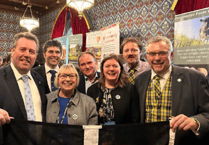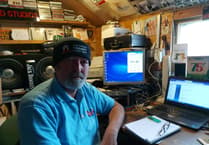A Korean war veteran from Lifton was invited to a special remembrance service at the Horse Guards Parade in London commemorating the 70th anniversary of the signing of the armistice which brought an end to the fighting in the Korean war.
Maurice Bradshaw, 93, was born at The Crescent in Lifton in 1929 and is the youngest of two sons. After leaving school, Maurice worked as an apprentice with WH Kinsman in Launceston and began learning his trade as a plumbing and heating engineer. In August 1950, Maurice was called up for national service and was enlisted at the Plumer Barracks in Plymouth. Shortly after, he was transferred to the Bulford camp on Salisbury Plain, Wiltshire.
In 1951, Maurice was sent for training in Austria before setting sail for Korea via Japan as a member of the United Nations forces.
After arriving in Seoul, Maurice was taken to the South Korean border which lies on the bank of the Imjin River. On arrival, Maurice took note of the complete devastation Seoul had endured.
He said: “People were starving, troops were sharing their rations.”
During his time in Korea, Maurice was a member of the Gloucestershire regiment which was under the command of Lt Colonel Guy Temple.
On April 22 1951, while Maurice and his troop were stationed on the river banks, the Chinese army crossed through the waters taking them by surprise. This battle, known as the Battle of the Imjim, was said to be one of the bloodiest endured by the British Army since the Second World War.
The battle went on for three days and prevented the encirclement of other United Nations forces. The regiment was awarded the Presidential Unit Citation and earned the nickname ‘The Glorious Glosters.’
In total, 90 men were lost out of Maurice’s regiment during the battle.
On the third day of the battle on April 25, 1951, after returning from the Imjin river, Maurice was ordered to fire a Bren gun as he travelled down the hill to the river, as a Chinese soldier had fired across his path with a ‘burp gun’ (a nickname given due to the sound made by a Chinese gun).
Maurice was captured during the Battle of the Imjim River on the third and final day.
Alongside other prisoners, Maurice was forced to march for four weeks deep into North Korea to a prison camp.
“Those who couldn’t make it were left to die,” Maurice explained.
The prisoners of war (POWs) were given little to eat. A Chinese soldier shared his millet ration with Maurice.
Any food which was given to them was eaten from their berets as they were waterproof.
“The further you got from the front, the more cruel the guards became.” Maurice added.
There were no fences at the prison camp, this was due to the fact that any POWs would stand out amongst the North Koreans.
The POWs slept head to toe with each other with 10 people per hut and they would partake in daily activities such as physical training, volley ball and bridge. Prisoners were also subjected daily to communist propaganda for hours on end.
Due to Maurice’s background in plumbing, he was given the responsibility of heating up water and cooking the rice. A highlight would be cooking the rice allowing the bottom of the pan to caramelise and the rice to become ‘biscuit-like’, this was considered a treat which all prisoners took turns in eating.
Maurice explained: “The Chinese thought that flies had been impregnated with disease by the Americans so everyone in the camp was required daily to kill at least 10 flies per day in return for one cigarette.”
Each was then given a fly swat.
Towards the end of his capture when peace talks began, the food at the camp slowly improved. On August 17, 1953, two and a half years after his capture, Maurice was release from the camp.
An armistice was signed which stopped the fighting.
Alongside others, Maurice was released across the Bridge of no Return, so called because once the bridge was crossed into South Korea there was no return, before being taken to Japan for repatriation. If the soldiers were fit they would sail home, if not they would stay in Japan until deemed fit to travel.
Once arrived back in the UK in Southampton, Maurice travelled on the train back to Launceston railway station where he was met by his mother and brother. A family friend, Dorothy Voysey, picked the trio up by car to Lifton where they were met by the entire village.
When finally home, Maurice encountered an unwelcome surprise from the Inland Revenue regarding their ‘board and lodgings’ supplied by the North Koreans!
He returned to work at WH Kinsman.
And today, Maurice still lives at The Crescent in Lifton and is looked after by his family.
Maurice has travelled back to Korea three times as part of a special remembrance the South Korean Government hold every year. Veterans and family members of the UN Forces are invited as guests of the South Korean Government to an all expenses paid commemoration in which the South Korean people show appreciation for their service.
This includes an invitation to the British Embassy in Seoul, and visits to other destinations such as battlefield sites and the Demilitarized Zone at the South/North Korean border.
More recently, on July 27 2023, Maurice and his family were invited to take part in the Royal British Legion commemorative service to remember what has become known as the ‘forgotten war’.
While at the ceremony, he was able to meet the Duke of Gloucester and the South Korean Ambassador along with other veterans.
Maurice was very pleased to be invited to the ceremony as it was the first of it’s kind to be held by the Royal British Legion: “It was very good, excellent.”
Philippa Rawlinson, director of Remembrance at the Royal British Legion, said: “More than 100,000 British and Commonwealth armed forces fought in the Korean War, facing harsh conditions, freezing winters and fierce battles. Many showed great bravery despite, at times, being heavily outnumbered by the enemy.
“More troops were killed in the Korean War than any other war since World War 2 yet now, 70 years on since the end of the conflict, many feel Korea is the ‘Forgotten War’. It is vital that we all remember and honour those who served in the Korean War and that the sacrifice of the 1,100 British men who lost their lives is never forgotten.”




